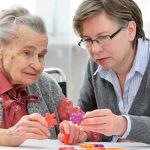In the UK we seem to think that the generations should be segregated with specialist retirement villages and starter homes for young people. Now, it seems, the Germans have a thing or two to teach us about intergenerational living. They have created centres where older people and children mix, to the advantage of both. These multigenerational houses are, as the UK’s Institute for Public Policy (IPPR) says, “recreating some of the extended family ties that people just don’t have as much anymore”.
The mothers’ centre in Salzgitter provided the first German role model in 2006. The idea, pioneered by the then family minister was to bring together under one roof, – childcare groups, youth centres, mothers’ clubs, advice centres and communities for older people. Every morning, little Emily and her great-grandmother make the same journey. The little girl plays during the day at the Salzgitter Childcare Centre, while her great-grandmother receives the care she needs under the same roof.
Model for the future
These multi-tasking houses were designed to offer an alternative for older people, who often feel lonely, and for young families who need support but have no grandparents living nearby. “People are rarely happy on their own”, believes Dr Eckart von Hirschhausen, patron of the multi-generation house in Berlin: “Which is why multi-generation houses are the model for the future: learning from one another, feeling needed, sharing joy. A real recipe for happiness!”
Here in the UK the IPPR has called for universal community centres in which activities for different age groups would take place separately but under one roof.
The whole thing seems logical, with many inbuilt mutual benefits. Generations mix, the elderly provide a helping hand with childcare services even as the children themselves enhance older people’s lives.
Ten-year-old Annie Donaghy recently spoke at a fundraiser in York about her grandmother who developed Alzheimer’s at 58, describing how her grandmother still looks the same, still dances to the radio, and lets her watch “dreadful” TV programmes. She saw her grandmother as an individual not a condition, recognising what she can do and helping when necessary. In Annie’s words, “Nana forgets, so I remember.”
There’s definitely a time and a place for children, but perhaps we should start mixing it a bit more, follow Germany’s lead and broaden our thinking about when and where that is. As Annie says, “Grown-ups don’t always understand the important stuff.”




